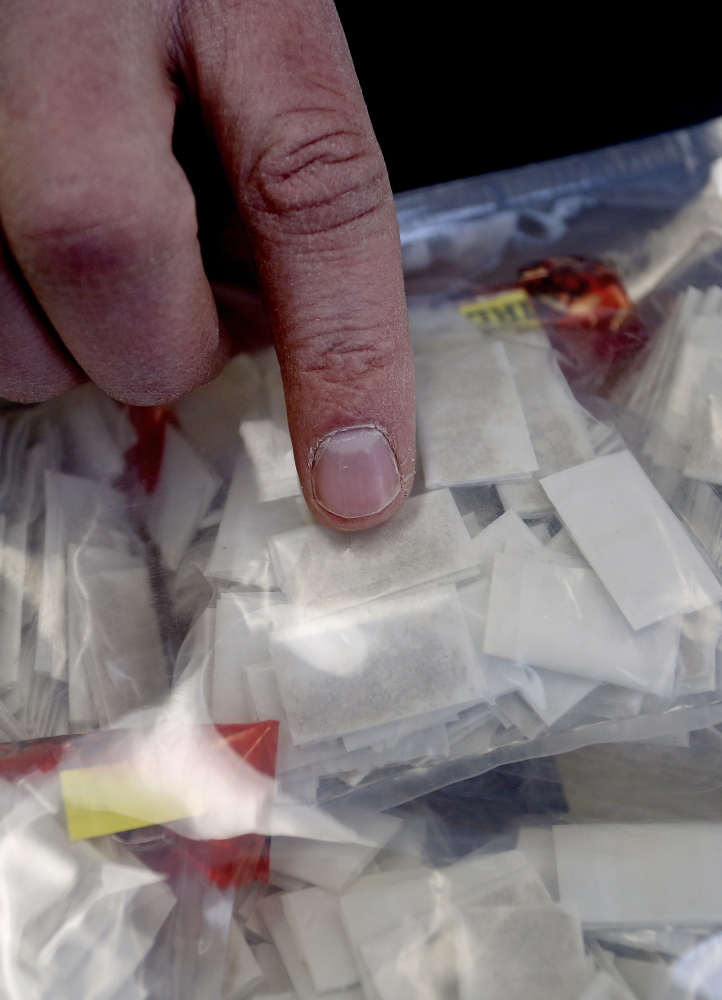‘Maine state trooper helps save life of driver who overdosed”: The April 24 Press Herald story grabbed headlines, while the trooper’s “dashcam” recording of the dramatic roadside rescue attracted over 180,000 views.
But my husband, the emergency department nurse and paramedic who was driving to work that morning and stopped to help, noted that little attention is paid when he and colleagues routinely treat heroin overdoses in the ED almost every day.
So with all due respect to the courageous state trooper who helped save a life that day, the bottom line is that Maine has a serious heroin problem, and we all need to act – not just in dramatic rescues, but in a multitude of ways to address a problem that nothing less than a crisis.
We’ve heard the numbers: Drug overdoses and heroin deaths in Maine have shot up dramatically over the past several years.
Heroin has become the drug of choice for many individuals addicted to narcotics because it’s cheap and easy to get – now often easier to obtain than the prescription opioid medications (e.g. oxycodone, hydrocodone) that have led to addiction for many.
So whose job is it to address this issue? The answer is clear: To end this epidemic, we need all of us. Here are a few ideas:
n Say no to opioid prescriptions. Maine is experiencing an epidemic of opioid overuse, and many individuals have turned to heroin after becoming addicted to opioids obtained legally or illegally.
While efforts are underway to educate health care providers on the risks of opioids, many providers are still quick to prescribe opioids, particularly following minor procedures or injuries.
Too often providers prescribe 30 or more tablets to treat minor conditions when much simpler and safer options could work. (Note: Tylenol and Advil taken together are highly effective for controlling moderate pain!)
And unused pain pills in medicine cabinets can be a tempting option for youth or individuals with addiction. If your doctor or dentist offers you a prescription for opioid medications, ask first if there are less risky options; if you do need them, ask for a smaller number of pills to cover the first few days after a procedure, when pain needs are greatest.
n Don’t judge addiction – treat it. Many people immediately reacted to the news story with disbelief that someone could take an overdose twice in a week, asking why users don’t just stop taking drugs or make better choices.
The hard reality is that addiction is a challenging and painful chronic disease that needs treatment – not judgment. Almost all of us know someone who has experienced the pain of addiction, if not to heroin, then to alcohol, opiates or tobacco. As noted by the parents of Molly Parks, the 24-year-old recent overdose victim, addiction can happen to any of us.
While we need to address issues of drug supply and trafficking, simply jailing or condemning individuals who are addicted to narcotics will not help. We must advocate for what works: substance abuse treatment, counseling and medications. Turning our backs on those who are addicted will only contribute to more untreated disease and avoidable deaths.
n Be prepared and help. Anyone who watched the rescue scene video might ask: Why didn’t anyone else stop?
While Trooper Douglas Cropper worked valiantly on the roadside resuscitation, an estimated 100 or more cars passed by. Some may have been pressed to get to work, but it’s likely others felt intimidated, not knowing if or how they could help.
But emergencies can happen to any of us. Learn CPR. Consider becoming a first responder. If someone you know is addicted to narcotics, talk with your doctor about getting a prescription for naloxone, the quick-acting medicine that can immediately reverse the deadly effects of an overdose.
Or next time, just stop. There’s probably something you can do to help.
n Get involved. This crisis affects all of us and needs our collective action, so find ways to get involved. Call your local Healthy Maine Partnership to see if there are efforts you can join in your community.
Check with your local school department or YMCA to work with youth or help in schools. And talk with friends and neighbors to raise awareness and find ways to help.
Like many headlines, this story was dramatic. Luckily, this one had a good ending. But let’s commit to working together to create fewer headlines and less drama. Without all of us, the next ending might not be such a good one.
Copy the Story Link
Send questions/comments to the editors.



Success. Please wait for the page to reload. If the page does not reload within 5 seconds, please refresh the page.
Enter your email and password to access comments.
Hi, to comment on stories you must . This profile is in addition to your subscription and website login.
Already have a commenting profile? .
Invalid username/password.
Please check your email to confirm and complete your registration.
Only subscribers are eligible to post comments. Please subscribe or login first for digital access. Here’s why.
Use the form below to reset your password. When you've submitted your account email, we will send an email with a reset code.